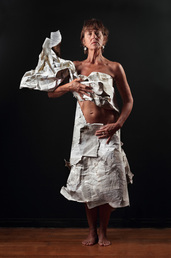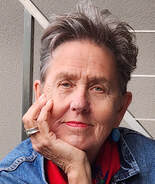I’ve been thinking about bodies a lot this week. About female bodies in particular. About having a body and being a body.
 Photo from "VISIBLE: 60 Women at 60" © Jenny O'Connor
Photo from "VISIBLE: 60 Women at 60" © Jenny O'Connor I have also been thinking about bodies because I have been looking through “Visible: 60 Women at 60”, a book of photographs of New Zealand women who are all the same age as I am. Wellington photographer, Jenny O’Connor who took the photographs and published the book earlier this year, is at the Arts Festival in Nelson this month to give a Workshop and to talk at the Page and Blackmore bookshop about the process of transforming creative ideas into a tangible outcomes.
It is common for women to feel less and less visible as their bodies age. I know a woman of a certain age who claims - only half-jokingly – that she is now so perfectly invisible that even automatic doors fail to register her existence.
Taken collectively the photographs are a portrait of a generation of New Zealand women who are daughters and sisters, wives, lovers and mothers but are also rescue workers, scientists, political activists, mountain climbers and artists. This generation, O’Connor says, “have done things that other generations of women have never done”.
The photographs are also of striking portraits of different quite individual women. They are of all physical types and cultural backgrounds and dressed in everything from body paint to Lycra, from hi-viz jacket to top hat and tails. Some wear hardly anything at all. Amongst the tools and talismans they have been photographed with are musical instruments, maps, bolts of cloth, flowers, a wheelchair, golf clubs and a jewelled skull.
Valerie Smith who has “a rather odd disability” (her description) is perched on a high stool in pillbox hat and fur stole. She looks as pert and as elegant as the bone china tea cup she has in her hand. Jennifer Shand, stands hands on hips, in jodhpurs and suede knee-length riding boots. Sue Bradford wears a lumber jack shirt and jeans. Taape O’Reilly brandishes a mere. Wendi Wicks appears as enigmatic as the yellow-eyed black cat she holds in her arms, while Julia Bracegirdle is a one-breasted Amazon astride her bicycle. All of the women are strikingly visible in both a physical and psychological sense.
It is common for women to feel less and less visible as their bodies age. I know a woman of a certain age who claims - only half-jokingly – that she is now so perfectly invisible that even automatic doors fail to register her existence.
Sadly, many women have an ambiguous and not altogether happy relationship with their bodies. They feel uneasy when their body is the subject of attention, especially the often unforgiving male gaze of the camera. For many women, therefore, becoming invisible is a relief and a liberation.
What made the experience so wonderful? Well, firstly, the eye gazing through the camera’s eye was female. The body behind the camera, and the body in front of it, had the shared experience of living sixty years in a female body with all its waxing and waning ambiguities.
Secondly, Jenny managed to create in her studio - a plain wood-floored space containing just cameras, lights and a blank backdrop and a box of dress-ups - a safely theatrical atmosphere in which the private and inchoate and unexpressed rose effortlessly to the surface and could then be made visible on film.
This thinking about bodies – the joys and the pains of this vehicle in which we spend our lives –
brings to mind a poem by U.S. poet Jane Kenyon:
The visibility of older women isn't just a local thing - this New York-based on-line magazine featured
"Visible: 60 Women at 60" on its front page for an entire week.
| OTHERWISE by Jane Kenyon I got out of bed on two strong legs. It might have been otherwise. I ate cereal, sweet milk, ripe, flawless peach. It might have been otherwise. I took the dog uphill to the birch wood. | All morning I did the work I love. At noon I lay down with my mate. It might have been otherwise. We ate dinner together at a table with silver candlesticks. It might have been otherwise. I slept in a bed in a room with paintings on the walls, and planned another day just like this day. But one day, I know, it will be otherwise. |
 RSS Feed
RSS Feed

